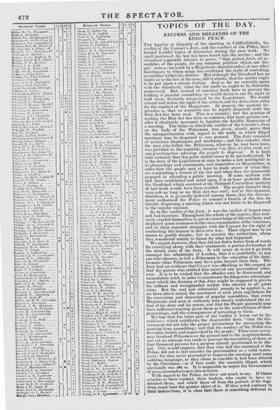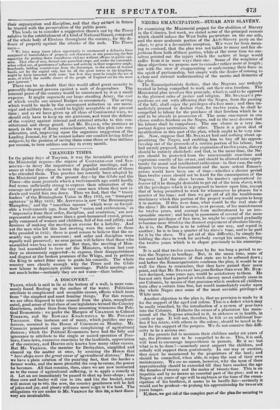TOPICS OF '11IE DAY.
KEEPERS AND BREAKERS OF THE KING'S PEACE.
THE legality or illegality of the meeting in Coldbathfields, Ille
m 0 verdict of the Coroner's Jury, and the conduct of the Police, have formed fruitful topics of discussion during the past week. No small portion of dry law has been forced into the service ; and the Standard especially labours to prove, " that, prima fade, all as- semblies of the people, for any common political olyject, are ille- gal," unless convened by a Magistrate, churchwarden, or any other functionary to whom usage has confirmed the right of convoking assemblies within his district. But although the Standard has no doubt as to the law of the case, still it admits, that the matter ought to be put upon a clearer footina. And so far we certainly agree With the Standard; what the law really is, ought to be distinctly
understood. But, instead of enacting fresh laws to prevent the holding of popular assemblies, we would desire to see the right to hold them distinctly recognized by the Legislature. We would extend and define the right of the subject, and lay down clear rules
for the conduct of the Magistrate. At present, the general im- pression is, that no assembly can be legally dispersed until the
Riot Act has been read. This is a mistake; but the practice of reading the Riot Act has been so common, that most persons con- sider it absolutely necessary to legalize the forcible dispersion of
a meeting. The terms in which the verdict of the Coroner's Jury on the body of the Policeman was given, clearly prove that the misapprehension with regard to the mode in which illegal meetings may be dispersed is very general. The Jury consisted of seventeen shopkeepers and mechanics ; and they consider that the man who killed the Policeman, whoever he may have been, was justified in the homicide, because "no _Riot Act was read, nor any proclamation advising the people to dispei7e. It is high time certainly that this point shoUld cease to be misunderstood. It is the duty of the Legislature at once to make a law intelligible in its phraseology and enactments, and imperative on Magistrates, in order that the people may at least be made aware of when they are committing a breach of the law and when they are innocently
engaged in attending a public meeting. If some uniform rule had been established and acted upon, it is at least probable that the bloodshed which occurred at the National Convention meeting
of last week would have been avoided. The people thought they were safe as long as no Riot Act was read; and at this moment, doubtless, it is generally believed'among them, that the Govern- meat authorized the Police to commit a breach of the law, by forcibly dispersing a meeting which was not liable to be dispersed ill the regular manner. t,
As to the verdict of the Jury, it was the verdict of honest men and bad logicians. Throughout the whole of the inquiry, they zeal- ou sly exerted themselves to get at a knowledge of the real facts, and displayed great acuteness in the cross-examination of the witnesses, and in their repeated struggles with the Coroner for the right of conducting the inquest in their own way. Their object was by no means to justify murder, but to censure the authorities, whom they considered mainly to blame for what had happened.
M We regret however, that they did not find a better form of words ,
for conveying along with their sentiments a precise declaration of the actual state of the facts. It will never do to let it go forth amongst the inhabitants of London, that it is justifiable, in any one who chooses, to kill a Policeman in the execution of his duty, because other Policemen may have gone beyond their duty. The Jury had no evidence that CULLY was offending in this respect, or that the person who stabbed him received any provocation what- ever. It is to be wished that the offender may be discovered, and immediately tried, in order to counteract theddngerous encourage- ment which the decision of this Jury might be supposed to give to the ruffians and wrongheaded zealots who abound in all great
cities. But the real and substantial remedy to be applied is, as we have above stated, the enactment of such plain regulations for the convening and dispersion of popular assemblies, that every ,-,
Maaistrate and man in authority may clearly understand the ex- m
tent of his duty and his power, and that the People generally may have sufficient warning given them as to the unlawfulness of their proceedings, and the consequences of persisting in them. We fear that the latter part of the verdict is borne out by the evidence; which establishes the disgraceful facts "that the Go- vernment did not take the proper precautions fbr preventing the meeting from assembling; and that the conduct of the Police was ferocious, brutal, and unprovoked by the people." There were se en teen hundred Policemen on the ground and in the neighbourhood; and yet no attempt was made to prevent the assembling of three or four thousand persons for a purpose already proclaimed to be ille- gal. One would suppose, that they who had the command or the Police, did not in fact consider the proclamation as a valid instru- went: for they never proceeded to disperse the meeting until some seditious language, as they chose to consider it, had been uttered" by the Chairman,—as if that made the assembly illegal, which
previously was nbt so. It is impossible to acquit the Government of gross misconduct upon this occasion.
\Vitt' regard to the Police, we have not much to say. If blame attaches to their conduct, their leaders, who ought to have re- strained them, and called them off from the pursuit of the fugi- tives, must bear the greater share of it. If they acted contrary to their instructions, it is clear that there is something deficient in. • . their organization and discipline, and that they sstlariot in future be trusted with the preservation of the public peace. This leads us to consider a suggestion thrown out by the Tinies „relative to the establishment of a kind of National Guard, composed of the whole body of Electors throughout the country, for the de- fence of property against the attacks of the mob. The Times says- " We have many times taken opportunity to recommend a defensive force composed of householders of property and character, as one possessing the best capacities for putting down tumultuous viohnee without offence to public opi- nion. That class of men, formed into parochial corps, and under the command, when called out, of gentlemen of influence and activity in their respective neigh- bourhoods, holding commissions from the Sovereign, in the nature of trained bands, not for the capital only, but for all the great towns in the kingdom, might be fairly intrusted with arms : but first they must be taught the use of arms, of which the middle classes of the people of England are for the most part ignorant."
There can be no doubt that this would afford great security to peaceably-disposed persons against a mob of desperadoes. The internal peace of the country would be maintained by it at a small expense. It might supersede our large standing Army, the cost of which swells our annual Budget .so enormously. The saving -which would be made by the consequent reduction in our muni- .cipal and military force, would be highly acceptable at the present time ; and as we have given up all ideas of Continental wars, we should only have to keep up our garrisons, and trust the defence of the country against internal and external attacks to this con- stitutional 4nd cheap guard. Let Mr. ELLICE, who promises so much in the way of Army retrenchment, take this plan into con- sideration, and, improving upon the sagacious suggestion of the Leading Journal, try if he cannot induce our comfort-loving fellow subjects, by the promise of saving them some three or four millions per annum, to turn soldiers one day in every month.

















 Previous page
Previous page